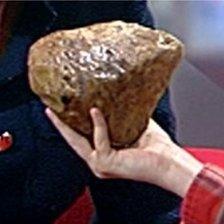Boy finds rare whale vomit on beach at Hengistbury Head
- Published

Charlie Naysmith wants to set up a nature reserve if he can sell the piece
An eight-year-old boy has discovered a rare piece of whale vomit on a Dorset beach which could be worth up to £40,000.
Charlie Naysmith found the 600g lump of ambergris in a patch of seaweed at Hengistbury Head in Bournemouth.
He said that when he first found it he thought it was a "normal stone".
But after looking it up on the internet with his father, Alex, they discovered that it was likely to be a rare form of vomit from a sperm whale.
Ambergris is found in the innards of the sperm whale and used in perfumes after it has been vomited up.
It is sought after because of its rarity and can float on the ocean for years before washing ashore.
Mr Naysmith, from Christchurch, said the lump his son found probably is about 20 years old and said he had been told it could be worth up to £40,000.
'Floating gold'
He said: "It's very rare.
"You don't hear of it coming around very often and it's only [found] in small amounts usually.
"In olden days they used it in perfumes and some medicines.
"I don't know if it's necessarily worth that much these days, but fingers crossed."
Charlie says he has already made plans for what he will spend the money on if they can sell the ambergris.
"I'm going to make a nature reserve for animals in this country," he said.

Ambergris is used in perfumes and medicines
Mythologised for thousands of years, ambergris has been referred to as "floating gold" by scientists and those who search for a windfall amid the surf.
It is a natural excrement thought to be used by the whale as a digestion aid and is expelled from its abdomen often while hundreds of kilometres away from land.
The hard beaks of giant squid, a main source of food for sperm whales, have often been found inside lumps of ambergris.
Initially, it is a soft, foul-smelling matter that floats on the ocean but through exposure to the sun and the salt water over years it turns into a smooth lump of compact rock which feels waxy and has a sweet smell.
It is still used in perfumes, although many perfume makers now use a synthetic version instead of ambergris because it is associated with whaling and the sperm whale is a vulnerable species.
- Published7 June 2011